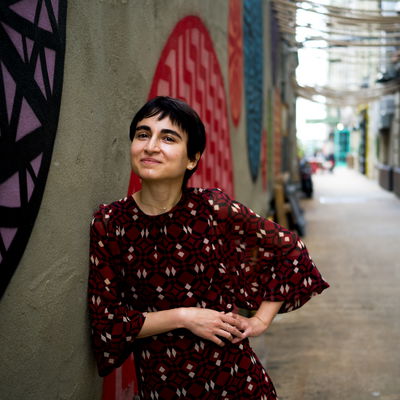
- Bring your own non-alcoholic drinks
- Non-alcoholic drinks provided
-
Wheelchair access
- Wheelchair Accessible
-
- Kid-friendly event
This is a groupmuse
A live concert in a living room, backyard, or another intimate space. They're casual and friendly, hosted by community members.
Host
I'm delighted to host the Ikeda Quartet with a program of string quartets by Ravel and Beethoven. Yuyu Ikeda (violin), Jihyun Baik (violin), Yat Lee (viola), and Sam Chung (cello) are the recent winners of the Ruth Widder String Quartet competition, and I cannot wait to hear them play live.
Doors open at 7 pm, music starts around 7:30 pm. Light refreshments will be provided.
Program:
Ludwig van Beethoven - String Quartet No. 8 in E minor, Op. 59 No. 2
Maurice Ravel - String Quartet in F major
What's the music?
Ludwig van Beethoven - String Quartet No. 8 in E minor, Op. 59 No. 2
Maurice Ravel - String Quartet in F major
Where does this music come from?
Maurice Ravel – String Quartet in F major
Written in 1903, Ravel’s only string quartet is a masterful blend of classical form and French impressionist color. Though initially met with mixed reception, it has become a cornerstone of the quartet repertoire. While clearly influenced by Debussy’s quartet, Ravel’s voice remains distinctly his own—elegant, precise, and harmonically rich.
The first movement introduces a graceful, singing theme that is developed with remarkable clarity and control. The second movement—marked Assez vif—is lively and spirited, full of pizzicato textures and vibrant rhythmic interplay that evoke a sense of playful motion. The third movement turns inward, offering a lyrical and suspended atmosphere that showcases Ravel’s sensitivity to color and texture. The final movement bursts forth with energy, weaving together earlier motifs and driving toward a brilliant and exuberant close. With its refined craftsmanship and radiant expressivity, the quartet continues to captivate audiences as one of the most beloved and distinctive works in the string quartet repertoire.
Ludwig van Beethoven – String Quartet No. 8 in E minor, Op. 59, No. 2 ("Razumovsky")
Composed in 1806, Beethoven’s Op. 59 No. 2 is part of a set of three quartets commissioned by Count Andreas Razumovsky, the Russian ambassador in Vienna. These works mark a turning point in Beethoven’s string quartet writing, embracing a more expansive structure, bold contrasts, and deeper emotional intensity—monuments of his "middle period."
The quartet opens with a stormy first movement, filled with dramatic tension and relentless drive. The second movement, marked Molto adagio, unfolds with solemn beauty and hushed reverence—reportedly inspired by Beethoven’s vision of a starry night. The third movement, a Scherzo, is rhythmically witty and features a Russian folk tune, a request to the quartet’s patron, Razumovsky. The final movement, full of rhythmic drive and brilliant interplay, brings the quartet to an electrifying close with Beethoven’s signature vitality and imagination.
Location
Exact address sent to approved attendees via email.
This is a groupmuse
A live concert in a living room, backyard, or another intimate space. They're casual and friendly, hosted by community members.
Host
Attendees











 Continue with Facebook
Continue with Facebook
 Continue with Google
Continue with Google
 Continue with Apple
Continue with Apple
Comments
Comment sections are only for participants.